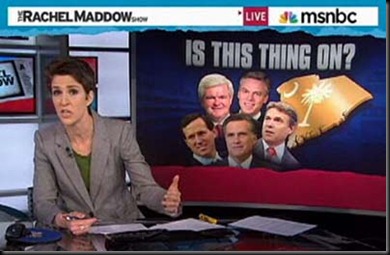I was watching Rachel Maddow run down the latest on the current (and dwindling) Republican presidential field. This is my screen capture from the segment:
It struck me all of a sudden: every face on that screen – except Newt – was the face of a “healthy-weight” person. Longer and thinner, and more angular because of that.
Not Newt. Newt is a kind of stocky guy, in the parlance of my childhood. He’s a heavier man. I don’t really care, figuring it to be his own business. But it does occur to me that any female candidate bigger than “pleasantly plump” (also in the parlance of my childhood*) would surely be the target of fat jokes just like any celebrity, of questions as to her ability to maintain control over things (she can’t even control her weight!), of some unspecified derision.
Such are the lives of fat women – criticized by unthinking people who have no clue whether it is a choice or not, and even if choice is involved, who are we to say?
So the absence of critique of Newt’s round face, or pudgy belly, or whatever fruit might be ripe for comedic pickings, is actually the way things should be: attention on the person’s policy beliefs, ability to get things done, to attempt to prove their worth as a leader. Which Newt will not, at least not to enough people.
But for all his bluster, I think Newt at least thinks of himself seriously, at least some of the time. I think he lives in a dream world, but within his framework, he at least attempts to make sense. And those are the things the voters focus on, for good or bad, when considering Newt. Not his weight. His ideas, his record, his potential. Hate him, love him, it’s not about his physique, it’s about what’s going on in that crackpot li’l head of his.
Which, as I noted above, is the way things should be. For everyone, male or female.
* I think from descriptions of“Bess” in the Nancy Drew books.
